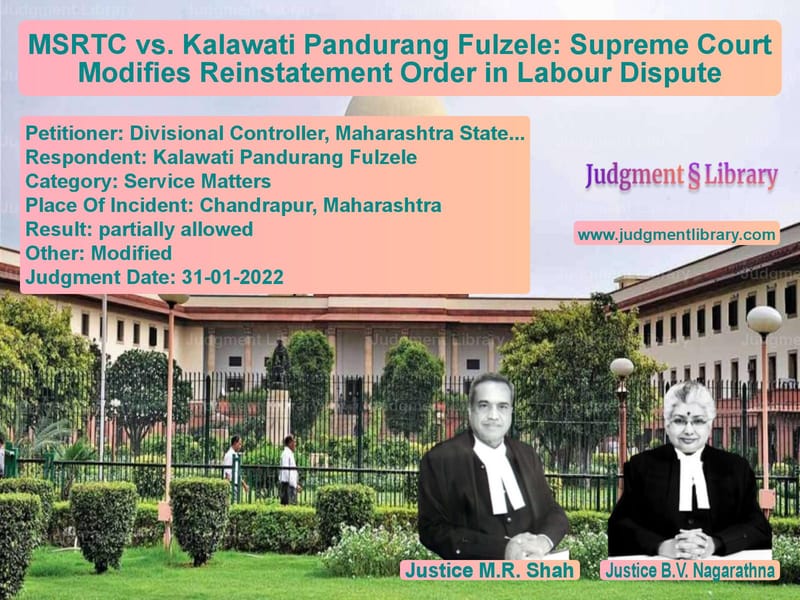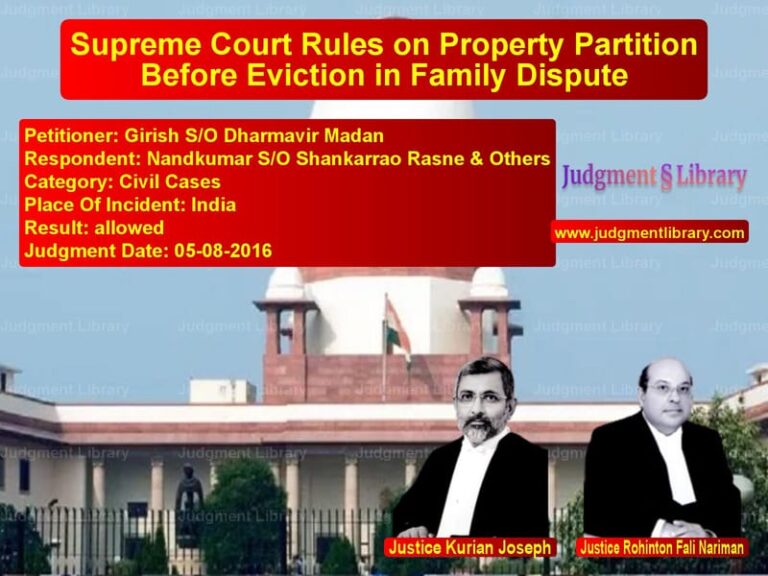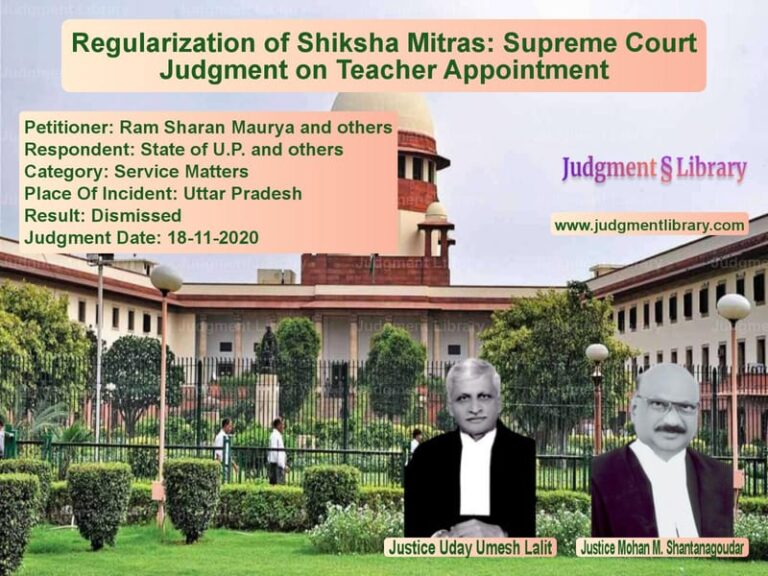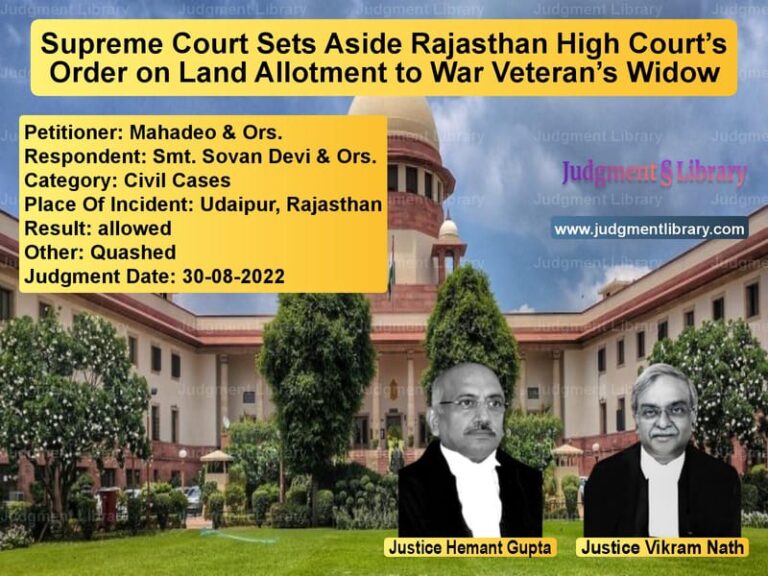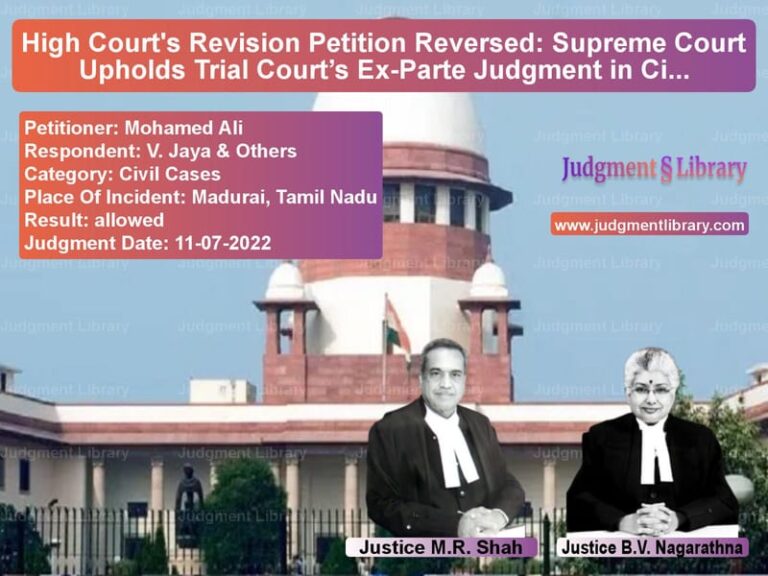MSRTC vs. Kalawati Pandurang Fulzele: Supreme Court Modifies Reinstatement Order in Labour Dispute
The case of Divisional Controller, Maharashtra State Road Transport Corporation (MSRTC) vs. Kalawati Pandurang Fulzele is a significant ruling on labour rights and the applicability of the Industrial Disputes Act, 1947. The Supreme Court examined whether a contractual employee was entitled to reinstatement with back wages after termination. Ultimately, the Court modified the reinstatement order and instead awarded a lump sum compensation.
This judgment has far-reaching consequences for temporary workers and the rights of employees under labour law. The Court’s decision balanced the rights of contractual workers while protecting employers from excessive liabilities.
Background of the Case
The respondent, Kalawati Pandurang Fulzele, was appointed as a sweeper at the Chandrapur Depot of the Maharashtra State Road Transport Corporation (MSRTC). She was first given a formal appointment on June 8, 1989, and later another appointment on April 1, 1991, with a fixed monthly honorarium of ₹500. There was an increase of ₹50 per month in her wages during her tenure. She continued working until she was terminated on August 1, 1994.
Kalawati challenged her termination by filing a complaint under Section 28 of the Maharashtra Recognition of Trade Unions and Prevention of Unfair Labour Practices Act, 1971, before the Labour Court, Chandrapur. Her key allegations included:
- She had worked continuously without any break in service.
- Her termination violated Sections 25-F and 25-G of the Industrial Disputes Act.
- She was not provided with any retrenchment compensation or a month’s notice before termination.
- No seniority list was prepared before her termination, as required under Rule 81 of the Industrial Disputes (Bombay) Rules, 1957.
Petitioner’s Arguments
The MSRTC, represented by Ms. Mayuri Raghuvanshi, argued that:
- Kalawati was only a contractual worker and not entitled to permanent employment benefits.
- Her employment was on a temporary, honorarium basis, and thus Section 2(oo)(bb) of the Industrial Disputes Act applied, exempting her termination from scrutiny under Sections 25-F and 25-G.
- She was given temporary employment because her husband, who had worked as a coolie at MSRTC, became blind, and she was given work on humanitarian grounds.
- Her employment was never intended to be permanent, and thus reinstatement with full back wages was not justified.
Respondent’s Arguments
Kalawati, represented by Subhasish Bhowmick, countered with the following arguments:
- She worked continuously for four years without a break, making her eligible for the benefits granted to permanent employees.
- Her termination violated the Industrial Disputes Act, which mandates that workers be given prior notice and compensation.
- The Labour Court had correctly ruled in her favour and ordered reinstatement with back wages.
Key Observations of the Supreme Court
A bench comprising Justice M.R. Shah and Justice B.V. Nagarathna made the following key observations:
- Kalawati’s appointment was on a contractual basis with a fixed honorarium of ₹500 per month.
- There were no allegations of unfair labour practices in her complaint.
- Even though she worked for four years, her employment remained temporary in nature.
- Ordering reinstatement with back wages was excessive, considering her temporary contractual appointment.
Final Judgment
The Supreme Court ruled:
- The reinstatement order was set aside.
- Instead of reinstatement and back wages, Kalawati was awarded a lump sum compensation of ₹3,00,000.
- The compensation had to be paid within four weeks.
- The ruling balanced the employee’s rights with the employer’s obligations.
Implications of the Judgment
The ruling has significant legal implications:
- Limitations on Reinstatement: Courts may not always grant reinstatement, especially for temporary workers.
- Monetary Compensation as a Remedy: In cases of wrongful termination, compensation may be considered instead of reinstatement.
- Employer Rights Protected: The ruling acknowledges the contractual nature of employment and limits obligations under the Industrial Disputes Act.
- Judicial Precedent: The decision may influence future labour law cases involving temporary workers.
Conclusion
The case of MSRTC vs. Kalawati Pandurang Fulzele is an important precedent in Indian labour law. The Supreme Court’s ruling ensured fairness by recognizing the temporary nature of employment while still providing financial relief to the worker. The decision reaffirms that reinstatement is not an automatic remedy and must be considered based on the nature of employment.
Petitioner Name: Divisional Controller, Maharashtra State Road Transport Corporation.Respondent Name: Kalawati Pandurang Fulzele.Judgment By: Justice M.R. Shah, Justice B.V. Nagarathna.Place Of Incident: Chandrapur, Maharashtra.Judgment Date: 31-01-2022.
Don’t miss out on the full details! Download the complete judgment in PDF format below and gain valuable insights instantly!
Download Judgment: divisional-controlle-vs-kalawati-pandurang-f-supreme-court-of-india-judgment-dated-31-01-2022.pdf
Directly Download Judgment: Directly download this Judgment
See all petitions in Employment Disputes
See all petitions in Termination Cases
See all petitions in Public Sector Employees
See all petitions in Judgment by Mukeshkumar Rasikbhai Shah
See all petitions in Judgment by B.V. Nagarathna
See all petitions in partially allowed
See all petitions in Modified
See all petitions in supreme court of India judgments January 2022
See all petitions in 2022 judgments
See all posts in Service Matters Category
See all allowed petitions in Service Matters Category
See all Dismissed petitions in Service Matters Category
See all partially allowed petitions in Service Matters Category

